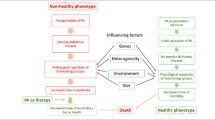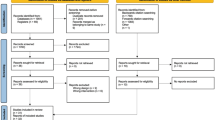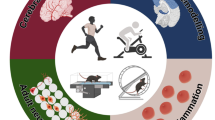Abstract
Objective
To evaluate the effect of nutrition combined physical exercise interventions on age-related cognitive decline by a systematic review and meta-analysis.
Methods
We searched 9 databases, including PubMed, EMbase, The Cochrane Library, Web of Science, Science Direct, China National Knowledge Infrastructure (CNKI), VIP Information, China Biological Medical Database (CBM) and Wanfang for studies published until the end of December 2019. The selected trials should meet the following criteria, study objects: healthy adults aged 65 and over with cognitive dysfunction or diagnosed as MCI, but not meet the diagnostic criteria for dementia as well as no restriction on follow-up time, race or gender. Study interventions: multiple interventions including nutrition and exercise. Exclusion criteria: (1) studies included elderly people with any type of dementia or patients with cognitive impairment induced by secondary causes, including drug, alcohol, severe organic brain diseases, mental disorders. (2) Republished literature. (3) Studies with significant differences in baseline data between groups. (4) The data in the study cannot be converted into the required data format. We reviewed and extracted information and assessed the risk of bias of recruited studies independently. Meta-analysis was performed using STATA v.15.1 software. The bias of publication was estimated by Egger test.
Results
A total of six RCTs representing 1039 participates were included in our meta-analysis. In terms of global cognitive function that has been assessed by neuropsychological test in different combinations, the result showed that the beneficial effect of nutrition combined exercise interventions was statistically significant [SMD = 0.23, 95% CI (0.1, 0.36), P = 0.0004]. There were no statistical differences from assays on MMSE scores, Memory, Executive Function, Attention, and Information Processing Speed across groups.
Conclusions
The current study shows that nutrition combined exercise interventions can improve global cognitive function in the aged with cognitive decline. Further researches emphasizing on longer follow-up time, experimental randomness, credibility and scale would better elucidate the effect of nutrition combined exercise interventions on cognitive function, particularly in older adults. (registration number: CRD42020159291, date of registration: 28/04/2020)




Similar content being viewed by others
References
Randolph JJ (2018) Positive neuropsychology: the science and practice of promoting cognitive health. Appl Neuropsychol Adult 25:287–294. https://doi.org/10.1080/23279095.2018.1457465
Lim YY, Maruff P, Pietrzak RH et al (2014) Effect of amyloid on memory and non-memory decline from preclinical to clinical Alzheimer’s disease. Brain A J Neurol 137:221–231
Roberts RO, Knopman DS, Mielke MM et al (2014) Higher risk of progression to dementia in mild cognitive impairment cases who revert to normal. Neurology 82:317–325
Knopman DS, Beiser A, Machulda MM et al (2015) Spectrum of cognition short of dementia: Framingham Heart Study and Mayo Clinic Study of Aging. Neurology 85:1712–1721
Lopez O, Becker J, Chang Y-F et al (2012) Incidence of mild cognitive impairment in the pittsburgh cardiovascular health study-cognition study. Neurology 79:1599–1606
Giusti P, Facci L, Skaper SD (2014) Neuroinflammation, microglia and mast cells in the pathophysiology of neurocognitive disorders: a review. CNS Neurol Disord—Drug Targets (Former Current Drug Targets) 13:1654–1666
United Nations (2017) World population prospects: the 2017 revision, key findings and advance tables. Department of Economics and Social Affairs PD, United Nations, New York
Scheltens P, Blennow K, Breteler MM et al (2016) Alzheimer’s disease. Lancet 388:505–517
Kalia LV, Lang DAE (2015) Parkinson’s disease. Lancet 386:896–912
Polidori MC (2014) Preventive benefits of natural nutrition and lifestyle counseling against alzheimer’s disease Onset. Journal of Alzheimers Disease Jad 42:475–482
Santos-Lozano A, Pareja-Galeano H, Sanchis-Gomar F et al (2016) Physical activity and alzheimer disease: a protective association. Mayo Clin Proc 91:999–1020
Li Z, Xin P, Wei X et al (2018) The effect of resistance training on cognitive function in the older adults: a systematic review of randomized clinical trials. Aging Clin Exp Res 30:1259–1273
Ma CL, Ma XT, Wang JJ et al (2017) Physical exercise induces hippocampal neurogenesis and prevents cognitive decline. Behav Brain Res 317:332–339
Dyall SC (2015) Long-chain omega-3 fatty acids and the brain: a review of the independent and shared effects of EPA, DPA and DHA. Frontiers in Aging Neuroscience 7:52
Fotuhi M, Mohassel P, Yaffe K (2009) Fish consumption, long-chain omega-3 fatty acids and risk of cognitive decline or Alzheimer disease: a complex association. Nature Clinical Practice Neurology 5:140–152
Ma F, Wu T, Zhao J et al (2017) Plasma homocysteine and serum folate and vitamin B12 levels in mild cognitive impairment and alzheimer’s disease: a case-control study. Nutrients. https://doi.org/10.3390/nu9070725
Devore EE, Grodstein F, van Rooij FJA et al (2010) Dietary antioxidants and long-term risk of dementia. Arch Neurol 67:819–825
Chai B, Gao F, Wu R et al (2019) Vitamin D deficiency as a risk factor for dementia and Alzheimer's disease: an updated meta-analysis. BMC Neurol 19:284. https://doi.org/10.1186/s12883-019-1500-6
Chen X, Maguire B, Brodaty H et al (2019) Dietary Patterns and Cognitive Health in Older Adults: A Systematic Review. J Alzheimers Dis 67:583–619. https://doi.org/10.3233/JAD-180468
van den Brink AC, Brouwer-Brolsma EM, Berendsen AAM et al (2019) The Mediterranean, dietary approaches to stop hypertension (DASH), and Mediterranean-DASH intervention for neurodegenerative delay (MIND) diets are associated with less cognitive decline and a lower risk of alzheimer’s disease-a review. Adv Nutr 10:1040–1065. https://doi.org/10.1093/advances/nmz054
Schneider N, Yvon CJ (2013) A review of multidomain interventions to support healthy cognitive ageing. J Nutr Health Aging 17:252–257
Follmann D, Elliott P, Suh I et al (1992) Variance imputation for overviews of clinical trials with continuous response. J Clin Epidemiol 45:769–773
Andrieu S, Guyonnet S, Coley N et al (2017) Effect of long-term omega 3 polyunsaturated fatty acid supplementation with or without multidomain intervention on cognitive function in elderly adults with memory complaints (MAPT): a randomised, placebo-controlled trial. Lancet Neurol 16:377–389. https://doi.org/10.1016/s1474-4422(17)30040-6
Blumenthal JA, Smith PJ, Mabe S et al (2019) Lifestyle and neurocognition in older adults with cognitive impairments: a randomized trial. Neurology 92:e212–e223. https://doi.org/10.1212/wnl.0000000000006784
Kobe T, Witte AV, Schnelle A et al (2016) Combined omega-3 fatty acids, aerobic exercise and cognitive stimulation prevents decline in gray matter volume of the frontal, parietal and cingulate cortex in patients with mild cognitive impairment. Neuroimage 131:226–238. https://doi.org/10.1016/j.neuroimage.2015.09.050
Ng TP, Ling LHA, Feng L et al (2018) Cognitive effects of multi-domain interventions among pre-frail and frail community-living older persons: randomized controlled trial. J Gerontol A Biol Sci Med Sci 73:806–812. https://doi.org/10.1093/gerona/glx207
Ondine VDR, van der Zwaluw NL, Tieland M et al (2014) Effect of resistance-type exercise training with or without protein supplementation on cognitive functioning in frail and pre-frail elderly: Secondary analysis of a randomized, double-blind, placebo-controlled trial. Mech Ageing Dev 136–137:85–93
Rodrigues ACR, Abujabra MFCA, Braga BF et al (2013) Creatine supplementation associated or not with strength training upon emotional and cognitive measures in older women: a randomized double-blind study. PLoS ONE 8:e76301
Fabel K, Kempermann G (2008) Physical activity and the regulation of neurogenesis in the adult and aging brain. NeuroMol Med 10:59–66
Levenson CW, Rich NJ (2008) Eat less, live longer? new insights into the role of caloric restriction in the brain. Nutr Rev 65:412–415
Poulose SM, Carey AN, Shukitt-Hale B (2012) Improving brain signaling in aging: could berries be the answer? Expert Rev Neurother 12:887–889
Nikolaos S, Yaakov S, Ming-Xin T et al (2006) Mediterranean diet and risk for Alzheimer’s disease. Ann Neurol 59:912–921
Wright RS, Waldstein SR, Kuczmarski MF et al (2017) Diet quality and cognitive function in an urban sample: findings from the healthy aging in neighborhoods of diversity across the life span (HANDLS) study. Public Health Nutr 20:92–101
Smyth A, Dehghan M, O’Donnell M et al (2015) Healthy eating and reduced risk of cognitive decline: a cohort from 40 countries. Neurology 84:1–8
Shah H, Albanese E, Duggan C et al (2016) Research priorities to reduce the global burden of dementia by 2025. Lancet Neurology 15:1285–1294
Dishman RK, Berthoud HR, Booth FW et al (2006) Neurobiology of exercise. Obesity 14:345–356
Firth J, Stubbs B, Rosenbaum S et al (2017) Aerobic exercise improves cognitive functioning in people with schizophrenia: a systematic review and meta-analysis. Schizophr Bull 43:546–556
Erickson KI, Voss MW, Prakash RS et al (2011) Exercise training increases size of hippocampus and improves memory. Proc Natl Acad Sci USA 108:3017–3022. https://doi.org/10.1073/pnas.1015950108
Smith PJ, Blumenthal JA, Hoffman BM et al (2010) Aerobic exercise and neurocognitive performance: a meta-analytic review of randomized controlled trials. Psychosom Med 72:239–252
Stewart KJ (2002) Exercise training and the cardiovascular consequences of type 2 diabetes and hypertension: plausible mechanisms for improving cardiovascular health. JAMA 288:1622–1631
Castillo AM, Franke WW, Russell SD et al (2006) Aerobic exercise, but not flexibility/resistance exercise, reduces serum IL-18, CRP, and IL-6 independent of beta-blockers, BMI, and psychosocial factors in older adults. Brain Behav Immun 20:201–209
Dipenta JM, Green-Johnson J, Murphy RJL (2004) natural killer cells and exercise training in the elderly: a review. Can J Appl Physiol 29:419–443
Lu Y, Christian K, Lu B (2008) BDNF: A key regulator for protein-synthesis dependent LTP and long-term memory? Neurobiol Learn Mem 89:312–323
Duman RS, Monteggia LM (2006) A neurotrophic model for stress-related mood disorders. Biol Psychiatry 59:1116–1127
Verghese J, Wang C, Lipton RB et al (2013) Motoric cognitive risk syndrome and the risk of dementia. J Gerontol A Biol Sci Med Sci 68:412–418. https://doi.org/10.1093/gerona/gls191
Hausdorff JM, Buchman AS (2013) What links gait speed and MCI with dementia? A fresh look at the association between motor and cognitive function. J Gerontol A Biol Sci Med Sci 68:409–411. https://doi.org/10.1093/gerona/glt002
Yogev-Seligmann G, Hausdorff JM, Giladi N (2008) The role of executive function and attention in gait. Mov Disord 23:329–342. https://doi.org/10.1002/mds.21720 (quiz 472)
Nadkarni NK, Nunley KA, Aizenstein H et al (2014) Association between cerebellar gray matter volumes, gait speed, and information-processing ability in older adults enrolled in the Health ABC study. J Gerontol A Biol Sci Med Sci 69:996–1003. https://doi.org/10.1093/gerona/glt151
Ezzati A, Katz MJ, Lipton ML et al (2015) The association of brain structure with gait velocity in older adults: a quantitative volumetric analysis of brain MRI. Neuroradiology 57:851–861. https://doi.org/10.1007/s00234-015-1536-2
Meiner Z, Ayers E, Verghese J (2020) Motoric cognitive risk syndrome: a risk factor for cognitive impairment and dementia in different populations. Ann Geriatr Med Res 24:3–14. https://doi.org/10.4235/agmr.20.0001
Cotman CW, Berchtold NC (2002) Exercise: a behavioral intervention to enhance brain health and plasticity. Trends Neurosci 25:295–301. https://doi.org/10.1016/s0166-2236(02)02143-4
Tombaugh TN, McIntyre NJ (1992) The mini-mental state examination: a comprehensive review. J Am Geriatr Soc 40:922–935
Funding
This work was funded in part by the Natural Science Foundation of Gansu Province in 2016 (Code:1606RJZA035). The role of NLRP3 involved in the molecular immune mechanism of Alzheimer's disease [(18) 0381].
Author information
Authors and Affiliations
Contributions
TL and NL performed data acquisition and screening. LL and LG participated in data analysis. TL and JT were responsible for the concept and designed the study. TL, ZH and LW discussed rational and revised the manuscript. JT made final approval of the version to be published. All the authors discussed the results and made devotion to the manuscript.
Corresponding author
Ethics declarations
Conflict of interest
The authors declare no conflict of interest.
Ethics approval
All analyses were based on previous published studies, thus no ethical approval and patient consent are required.
Informed consent
Being a review of previously published material, no informed consent was asked.
Availability of data and material
All data are fully available without restriction.
Additional information
Publisher's Note
Springer Nature remains neutral with regard to jurisdictional claims in published maps and institutional affiliations.
Rights and permissions
About this article
Cite this article
Liu, T., Li, N., Hou, Z. et al. Nutrition and exercise interventions could ameliorate age-related cognitive decline: a meta-analysis of randomized controlled trials. Aging Clin Exp Res 33, 1799–1809 (2021). https://doi.org/10.1007/s40520-020-01730-w
Received:
Accepted:
Published:
Issue Date:
DOI: https://doi.org/10.1007/s40520-020-01730-w




